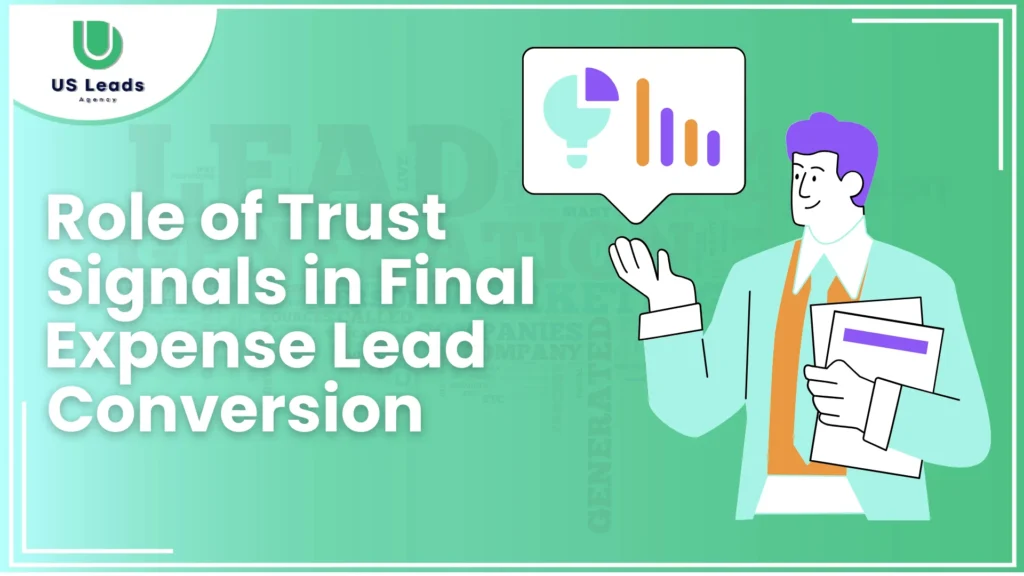
In the competitive world of final expense insurance, converting leads into paying customers is a major challenge. With numerous providers vying for attention, establishing credibility and building trust with potential clients is critical. Trust signals key elements that reassure customers of your legitimacy play a crucial role in this process. These signals enhance customer confidence, build trust, and drive conversions.
In this article, we’ll explore the role of trust signals in final expense lead conversion.
Key Takeaways:
- Trust Signals Are Essential: Trust signals like SSL certificates, customer reviews, and industry certifications reassure potential clients about your credibility.
- Emotional Connection: In the final expense market, building emotional trust is just as important as offering a product.
- Boost Conversions: Displaying trust signals at key points in the customer journey (like checkout) can significantly improve conversion rates.
Table of Contents
Role Of Trust Signals In Final Expense Lead Conversion: Ultimate Guide
Final expense insurance deals with sensitive matters, as it helps individuals plan for end-of-life expenses. Many potential customers are older and may feel cautious due to the financial commitment involved. Trust signals play a pivotal role in reassuring them that they are dealing with a reliable, professional, and reputable business. When customers trust your website and services, they are much more likely to take action, whether it’s filling out a form, making inquiries, or purchasing a policy.
Key Types of Trust Signals For Final Expense Lead Conversion:
1. SSL Certification (Secure Socket Layer):
SSL certification is crucial for any business handling sensitive personal or financial data. It provides a secure connection, reassuring visitors that their information is safe from cyber threats.
2. Customer Testimonials and Reviews:
Positive testimonials, whether written or video, create social proof. These reviews build credibility and demonstrate that others have trusted your services.
3. Industry Certifications and Accreditations:
Certifications from recognized organizations such as the NAIC (National Association of Insurance Commissioners) or ACLI (American Council of Life Insurers) enhance your reputation and signal to customers that you adhere to professional standards.
4. Professional Website Design:
An intuitive, easy-to-navigate, and aesthetically pleasing website design can significantly impact customer perceptions. A professional design assures potential clients that you are reliable and trustworthy.
5. Privacy Policy and Terms & Conditions:
Transparency about how you handle customer data is key to building trust. Ensure your privacy policy and terms & conditions are clear, easily accessible, and updated regularly.
6. Trust Badges and Security Seals:
Displaying well-known trust badges, such as McAfee, Norton, or BBB, signals to visitors that your site is safe to engage with.
7. Clear Contact Information and Availability:
Offering easy-to-find contact information and multiple ways to reach you (email, phone, live chat) reassures customers that they can get help whenever needed.
8. Money-Back Guarantees and Risk-Free Offers:
A clear refund policy or risk-free trial offers potential customers a safety net, alleviating concerns about making a financial commitment.
Conclusion – Role of Trust Signals In Final Expense Lead Conversion:
In the competitive world of final expense insurance, trust signals are more than just nice-to-have features, they are essential for converting leads into paying customers. Incorporating trust-building elements like SSL certificates, customer reviews, and professional website design can significantly boost conversions, foster lasting customer relationships, and improve your bottom line. By implementing these key trust signals and following best practices for their placement and authenticity, you’ll build a sense of security that encourages prospects to take the next step in their insurance journey with confidence.
FAQs:
What are trust signals in the final expense insurance market?
Trust signals are elements on your website or in your communication with customers that build confidence, such as SSL certificates, customer reviews, industry accreditations, and clear contact information.
How can I implement trust signals effectively on my website?
Place trust signals in visible, high-traffic areas like the homepage, landing pages, and checkout pages. Ensure consistency across all platforms and provide transparency in your policies and pricing.
Can customer reviews improve lead conversion?
Yes, authentic customer reviews provide social proof and build trust, making prospects more likely to engage with your services and convert into customers.
